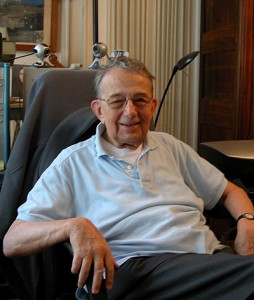Jean Kohn
 Testimony of Jean Kohn,
Testimony of Jean Kohn,
extract of his booklet «A civilian in uniform 1943-1945»
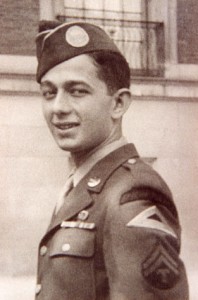 One day in august we were told: “OK, boys, here we go”
One day in august we were told: “OK, boys, here we go”
We were put, I would say, in a secret part of the camp or another place near the airport. We were ordered not to talk to anybody anymore, to gather all our gear, all our arms, knives, carbines, sub machine guns, plastic explosives, the works. We also had maps, 10,000 French francs and twenty 20-Francs gold coins. In addition we were given a note signed by US General Benjamin F. Caffey…
… We started one night in a Halifax bomber from Blida airport, west of Algiers. A mixed crew manned this plane, the pilots were British, the “dispatcher” (steward) was Australian and we of course were American boys. But on that trip, that night, we did not jump. We came back…
… This original jump site was the Maquis of Picaussel, west of Quillan, under the command of Lucien Maury. The night return to Blida was nerve racking since we were all prepared to go and jump.
We flew again on the night of August 10th and then we landed at another site Le Clat; near Axat not far from Quillan, due south from Carcassonne. We landed on a very very rocky type of hill.
I think my buddy, Bill Strauss broke one or two ribs, and Sergeant Sampson hurt his coccyx. Later on we said jokingly we landed on an anti-parachutist type field. But everything came out all right. In fact this had been selected to receive equipment only and not paratroopers.
The Maquisard thought for a little while we were German paratroopers. It is a good thing they did not shoot at us.
As I landed, I kissed the ground, since I felt I was “back home”…
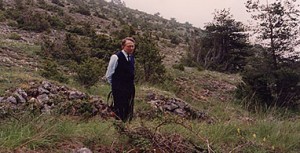
… We landed early in the morning of August 11th 1944 at the Clat. It was still dark. We heard some men talk French. Contact was made immediately. We collected our gear and all the containers filled with the equipment, which had been dropped at the same time. There was a truck and some cars waiting for us. We loaded the whole lot of containers of arms and equipment and we went on the road hoping there would not be any Germans waiting for us since airplanes flying at night do make an awful big noise.
We went to Salvezines from Axat, and then up the road to a house called the Nicoleau Farm (Ferme Nicoleau).
There we were greeted by a whole bunch of young men, maybe two hundred, most of them young French boys who had refused to be drafted into the forced labour organization that the French administration (Vichy Government) had worked out with the German Nazis…
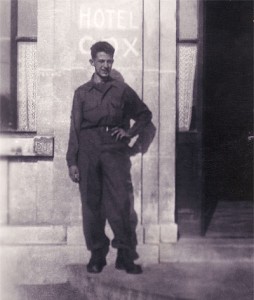 … Each member in the maquis had an assumed name. The purpose of this was to insure the safety of the families back home should they get caught. One man whose real name was Jean Millner called himself ‘Caplan’. He was a Jewish young fellow from Paris. He had managed to work his way south and ended up in this group. I asked him why he had taken a typical Jewish “nickname”, when it would have been much easier to be called Duran or Dupont. His answer, heroic or not was –“if I get caught, then I want to die with my head high as a Jew.”
… Each member in the maquis had an assumed name. The purpose of this was to insure the safety of the families back home should they get caught. One man whose real name was Jean Millner called himself ‘Caplan’. He was a Jewish young fellow from Paris. He had managed to work his way south and ended up in this group. I asked him why he had taken a typical Jewish “nickname”, when it would have been much easier to be called Duran or Dupont. His answer, heroic or not was –“if I get caught, then I want to die with my head high as a Jew.”
To this day I cannot agree. A dead hero is dead
We established our camp at the ferme Nicoleau, near Salvezines…
… Then one day, a fateful day, August 17th 1944, we were told German troops from Carcassonne were on the move to take some food from a large warehouse near Alet, in Couiza… The various Maquisard groups tried to immobilize the convoys. Reinforcement was called in from Carcassonne and many poor French boys were surrounded and mercilessly by the German infantry. That was in the morning of August 17th. In the afternoon, the Germans took some hostages to walk in front of their trucks and started to go north toward Carcassonne. We were supposed to stop them.
I was always a volunteer for that kind of thing. Lt Swank, Claude Galley, John Frickey, Rock Veilleux, and myself started north from Quillan with explosives. I do not know what roads we took to go there. Apparently we must have gone unnoticed around Couiza and Esperaza. We were guided by our FTP maquisards. We were to blow the road north of Alet where the Aude River flows in a narrow gorge. The large stone falling from the cliff on the road would halt the German convoy that would have to stop to move the stones. Then we would shoot at them.
As so-called Red Cross ambulance came by going south. The driver saw what we were up to and he told the Germans. The enemy convoy infantry support rushed toward us faster than anticipated and caught us not totally prepared. In addition, Lt Swank and Galley had problems with the explosives, which did not go off as intended. They did not have enough time to set up another explosion. The road was not blocked, and the large group of real tough German soldiers came rushing up the road shooting with all they had.
At that very moment Lt Swank got shot and killed. I do not know exactly how he was immobilized. A German officer finished him with a shot in the head.
Claude Galley was shot badly in the hand. He managed to escape
As for myself, I was alone on the cliff overhanging the road where I had been told to be to cover the road. Two German came up on the cliff from behind. They wanted to shoot me.
One of them said in German very clearly:
“Recht fünf meters.” (On the right: five meters)
That was I they were talking about.
They threw a potato type hand grenade that landed real close and when it went off, my woollen cap blew off. I was hit on my right thigh (at the time I did not realize I was slightly wounded).
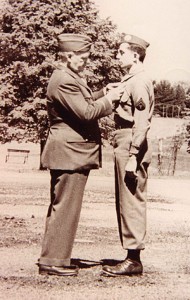 Then I had three choices:
Then I had three choices:
-I surrender-NO
-I fight back-NO, they were two with a sub machine gun and I was alone.
-I flee-YES
I remembered our orders: Do not fight if “they” are more numerous than you.
So I fled.
I did not know I was wounded, even slightly. I went up the mountain. I heard some shots during the night. I slept in the mountain. I had been scared, scared, I mean very afraid to be shot, to be taken prisoner or I don’t know what…
I finally saw a farm or what I thought did look like a farmhouse.
I looked at it for a long time to make sure there were no Germans there.
I ran a little, approaching it cautiously, stopped for a while, still inspecting it. Then I rushed in and asked quickly:
“Any Germans around?”
“No.”
Then, “Please give me something to drink”.
They gave me some water and probably some food…
Upon reaching Quillan, I found out that Paul Swank had died, had been killed. I was shocked…
I remember vividly Lt Weeks kneeling at the open coffin holding the cold hand of Lt Swank…
